#copper bottom stainless steel
Explore tagged Tumblr posts
Text
Find Quality Double Walled Bottles at Sumeet Cookware

The ultimate companion for your hydration needs. Designed with precision, its double-walled insulation ensures your beverages stay hot or cold for hours. With a sleek and durable stainless steel construction, this bottle is perfect for both indoor and outdoor activities. Say goodbye to lukewarm drinks and hello to refreshing hydration with our Double Walled Bottle. https://sumeetcookware.in
#best kitchen cookware items#Stainless Steel Double Walled bottle#Kitchan intems#Double Walled bottle#disinfecting water bottles#Buy Stainless Steel Water Bottles#unique storage containers#copper bottom stainless steel#sumeet india#sumeet kitchenware#steel water bottle#stainless steel water bottle#hot and cold water bottle#flask water bottle
0 notes
Text
KITCHEN BASICS
Or: Nobody Taught Me How To Cook
Ok so you find yourself in the position of needing to cook for yourself but have no idea what you’re doing. This is a quick overview.
This is a combination Oven / Gas Range
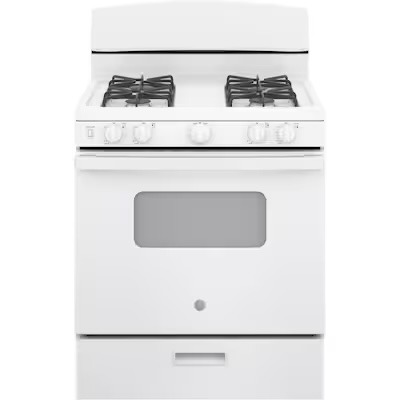
It’s a box that gets hot. Fire comes out the top. Very useful. Do your Cooking here. Medium heat is ideal for most things. The urge to crank the heat to cook things faster is a Rookie Mistake; you have been warned.
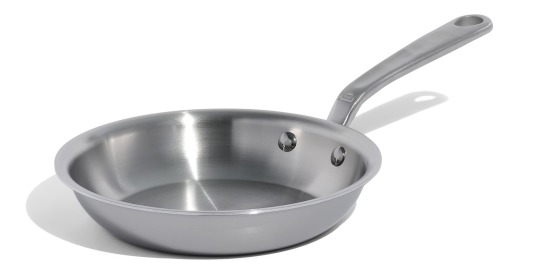
This is a Frying Pan. You want Stainless Steel with riveted handles. No cast-iron, no tricks, no non-stick coatings, no copper bottom. Every Commercial Kitchen I ever worked in used these basic-ass frying pans. You can hit ’em with steel wool and throw them in the dishwasher and get them so hot it’ll set your shit on fire and they’ll never wear out. Absolute miracles of modern metallurgy and you can get a really decent one for like $40.
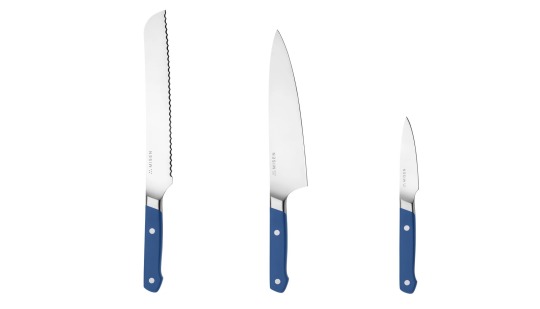
You need 3 Knives: a little one, for fine work; a big one, for chopping; and one with teeth, for tough stuff you gotta saw through. These are generally called Paring, Chef’s, and Bread Knives, respectively. You can get really good ones for $10-30 per knife; all further costs are mark-ups and decoration. All other knives are derived from these three, and are only necessary for very specialized tasks.
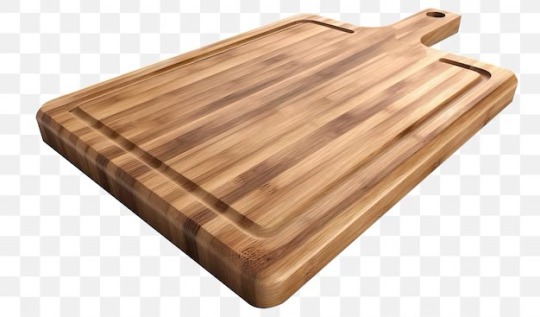
This is a good Cutting Board. Wood is ideal, and this one has a channel along the edges to catch juices that run out. Running through the dishwasher is unnecessary.
41 notes
·
View notes
Text





One of my favourite stim items are fidget necklaces! They are something discreet I can wear in public, but also usually something I get compliments on!
Starting from the top left, we have our Snaketwist Necklace! These are made of Iron/copper metal alloy. Our snaketwist necklaces are 36" long and 8mm thick. This is approximately the thickness of a sharpie. There is no clasp. They are bendable and perfect for stimming. If you're familiar with tangles, these twist in a very similar manner! (These are available in several different colours).
In the top right, we have our Mobii Necklace (by Steel Lynx). This is available in several different pride colours. This features a pendant with rings that you can continuously turn as all rings overlap each other. There is also a listing that doesn't have pride colours here!
In the bottom left is our Dragon Fidget Necklace. The tree part of the pendant can endlessly turn and is perfect for fidgeting with! These are made of stainless steel.
In the bottom right is our Moon & Star Fidget Necklace. This necklace is made of copper and like the dragon fidget necklace, the piece with the star is turnable! (These are available in 3 different colours).
We now also have a Planet Spinner Necklace!
FlappyHappy is a small stim toy business run by autistics. Please help spread the word about us! We really hope to be successful and be able to make stim toys affordable and accessible to those who need them.
We also offer free worldwide shipping on orders that are $70 CAD or more.
Website | Facebook | Twitter | TikTok | Instagram | YouTube
Here’s a video example of the moon and star one if you’re interested!
160 notes
·
View notes
Text


Architect John Lautner’s iconic Wolff House, designed as a homage to his mentor Frank Lloyd Wright, was for sale for $6.7M and was purchased by Hearst Heiress Amanda Hearst & her husband for $5.9M. It was built in 1961 in Los Angeles, California, has only 1bd & 1.5ba. A guest house was added in 1970.

The front entrance has a very cool "porch."

A copper roof connects the main house to the 3bd guest house.



A vast living room flanked by 16ft-long windows is alongside a modernized kitchen and dining room on the main floor.

The dining area, I think. It's hard to tell when rooms are empty.

The gleaming kitchen is outfitted with stainless steel cabinetry.


Entrance door opens to a rounded stairway with the kitchen off to the left.



On the middle floor is the master bedroom suite.

A deck fills the bottom level, two stories above the street.


Next to the deck is an angular swimming pool.
129 notes
·
View notes
Text
I- I think it worked 👀
[click here] for Before pictures
10 hours, 4 days, $18, and a few bandaids
This method is for removing surface patina rust from stainless steel loom reeds, and assumes you have already prepped the reeds by removing the tape
Equipment
wire brushes (stainless steel and copper)
leather work glove for off hand
eye protection
dust mask (I used a kN95)
Rustoleum rust dissolver jelly
nylon brush for acid gel application (mine came multipack w/ the wire brushes)
flat surface on which to lay the reeds (I suggest waist high so you don't hurt your back)
newspaper or tarp to cover it and the work area if you care about acid drips
clothes you don't care about if they happen to get acid on them (looks like bleach stains)
a bucket or two of water in case of acid spill or skin contact
garden hose to spray off the acid
a sunny day or ventilated space to let the reeds dry
WD-40 silicone spray
Steps & Tips
you might just want the pair of gloves, as all my abrasions are from my dominant hand slicing past the exposed reed ends. Unfortunately I could only find the single glove =/
hold the bristles of the wire brush at 45° to the reed surface
switch out the different wire brushes. Use stainless steel to start, then switch to the softer copper to brush away dust, and to buff. If you can, use an old wire brush whose bristles are bent and tangled to provide more angles of attack on the rust.
in the initial wire brushing, turn the reed over AND flip it upside down, then turn it over AGAIN to get all 4 sides of the reed. You may find this helpful if your wire brushes are new, where the bristles can't get too far in between the reeds with each pass.
also brush lengthwise down the surface of the reeds
use the nylon brush to brush between the reeds before applying the rustoleum gel. No reason, other than you can more easily see how effective the gel is.
apply the gel with the nylon brush. Just dip it right into the jar. Paint a thin line along the edges of the reeds, scrub, then tackle the inside surfaces, as it does drip if there's a lot of it.
coat every surface of the metal you want to address. Flip it over and do the other side, too. Try not to get too much on the string and glue between the reed ends.
it's probably fine if it dries, but it'll be harder to remove with just water. I did one at a time to avoid this.
Power Wash that thing. Both sides. Then set it to dry in a sunny spot. You be the judge if you have to bring it inside overnight.
after a day of drying, repeat the front-back-top-bottom metal brushing. You may want to brush the dried gel from the string interlacements. Don't be discouraged if it doesn't look perfect. Again, use the nylon brush to clear dust.
if you've foregone the mask thus far, you do you, but you might want it for the silicone. It smells, and it hangs in the air. You'll also want newspaper or a tarp for this bit. WD stands for "water displacement" so it's not good to get on plants. I also did this bit wearing the leather glove (it will get silicone on it).
spray the front and back, and if you think you missed a spot (at this point it'll be soaked, that's unlikely) flip it over and do the front and back again. Prop it up to dry.
Miraculous! The high-powered spray whisked away all the remaining surface rust, leaving metal that looks like metal and not a shipwreck on the ocean floor.








I'm going to wait a day or two before applying new tape, just to be sure that the string wrap is completely dry. Then to warp a short junk piece to check for burrs and clean any residue. 🤞
=D color me pleasantly surprised
2 notes
·
View notes
Text
Have another jewelry psa for you that's kind of an all encompassing, here's everything post from someone that works in coding at a repair depot.
Please don't wear your jewelry into pools, hot tubs, the ocean, etc. The chemicals are bad for your jewelry and can really tarnish silver! If it's a base metal (not gold or silver or brass or even tungsten or stainless steel; i.e., copper), it can not be cleaned and polished or even repaired, so please be careful with it! Oh and especially jewelry with opals in it please be careful getting those wet!
Don't shop at JCPenney.
Stainless Steel is something that's harder to work on and only some jewelry repair depots can do anything with it. This is because of the high melting point and also trying to match the finish on it.
For the love of God don't get tungsten. You cannot size tungsten or repair tungsten at all and it can be very brittle. I had one come in completely shattered and the ticket said it was hit by a basketball.
Don't shop at JCPenney.
I personally don't think hollow jewelry is worth it at all. Specifically earrings. You cannot undent those or do much repairs with them cause yeah they'll just break they're an automatic buyout for us.
For my depot, repairs can take upwards of five weeks, depending on the type of repair. Sizing? Little easier, takes a couple weeks, depending on how much we're Sizing it up or down (if we're taking it from a 7 to 13, it'll take just a little longer to make sure everything's secure). If we have to reshank (this happens when the band of the ring is too thin, meaning it's measuring under .70mm or it's yknow missing the entire bottom half), or replace missing stones (and match it by the color, clarity and size), or anything that's a true repair, it does take a little bit longer and typically is within those 5 weeks unless it's something super heavy and crazy. Custom pieces, where you ask the jewelry to make you a completely new piece, can take at least a month!
Don't shop at JCPenney
Cubic zirconia rings are cheaper than diamonds and I guarantee you they're much prettier go for those.
If your piece of jewelry is causing itchy and red skin, namely if it's white gold or silver, there's a solid chance you have a nickel allergy. Let that be known when you go to send it off and they can plate it differently. It'll still keep that same color but that way it won't cause an allergic reaction.
You can tell what your jewelrys metal type is by looking at the stamp on it! Some examples;
925 - Silver. However, 925 + 1/20 is platinaire and yes it'd confusing because I swear to God, when the stamp starts to wear off, it only ever wears off the + 1/20 and not the 925.
Typically, when it comes to gold, it'll say 10k or 14k (those are the most common I've seen in the U.S., though once in a while I'll see 18k, and I've had one 20k and one 9k). However, and especially on chains, I'll see the 585 for 14k, for example.
SR BR means silver over brass, and just BR is brass. Though sometimes it'll be silver over brass and it'll just say BR.
Don't shop at JCPenney.
You can tell if pearls are real by rubbing them on your teeth. I found this out after I saw our stores owner doing that. Yes it's weird. Real pearls feel rough and gritty, fake ones feel smooth.
Pearls are also a bitch bc if the clasp breaks or anything you have to resting them. Or if they're on a ring or earring and come off, you have to reglue them onto the little spike rather than resetting them and tipping the prongs around them. It's weird as hell to me.
I recommend being careful if you see earrings that have a snap setting. On the sides, they remind me of like tulip seems for some reason and the prongs they have set very flimsily over the earrings and curl over them versus your standard prong that rests against the sides of the stone. They are super fucking frail and will break if you do anything to them repair wise and don't offer really any security for your stones. Below is an example picture but I hope my descriptions pretty apt
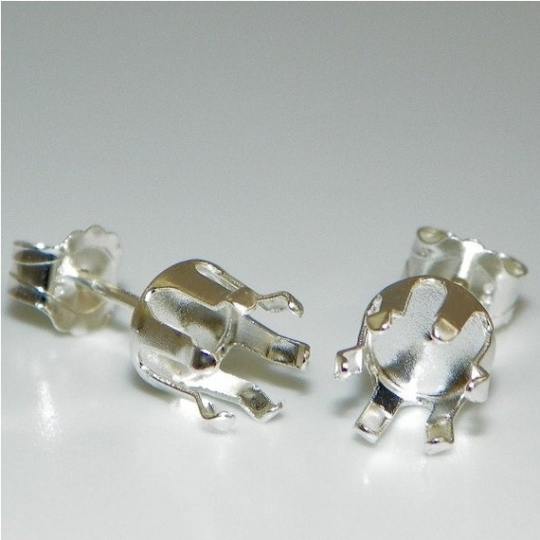
DON'T SHOP AT JCPENNEY!!!!!
I have found you can find better sales in department stores than you can on their online site. My ring was marked at 200 but my man's got it for 87 bucks and I've never been more proud.
JCPENNEY JEWELRY IS CHEAP AND IT SUCKS AND THE PROTECTION PLANS ARENT WORTH IT IF YOU'RE NOT SPENDING HUNDREDS OR THOUSANDS OF DOLLARS ON SOMETHING JUST DON'T BOTHER THEY ARE THE BANE OF MY EXISTENCE.
If anyone wants to know more jewelry tips please feel free to ask! Or if you have some, add onto this.
13 notes
·
View notes
Text
"The Essential Guide to Cookware: Choosing the Right Pots and Pans for Your Kitchen"
Introduction: Cookware is the unsung hero of every kitchen, silently contributing to the delicious meals we enjoy daily. Whether you're an amateur home cook or a seasoned chef, having the right cookware can make a world of difference in your culinary adventures. In this blog, we'll explore the various types of cookware, their materials, and how to choose the best pots and pans for your cooking needs.
The Fundamentals of Cookware :Before delving into the specifics, let's cover the basics. Cookware is typically categorized into two main types: pots and pans. Pots are deep vessels with high sides, while pans have flat bottoms and low sides. Each serves its unique purpose, from simmering soups in a pot to searing steaks in a pan.
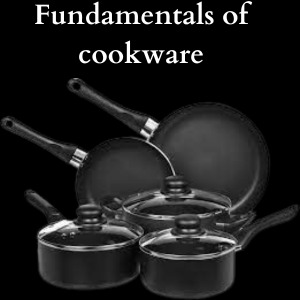
Cookware is an essential part of any kitchen, serving as the foundation for preparing delicious meals. These kitchen tools come in various shapes, sizes, and materials, each designed for specific cooking methods and recipes. Understanding the fundamentals of cookware is key to becoming a proficient cook.
Materials Matter: The material of your cookware affects how evenly it distributes heat, its durability, and its overall performance. Here are some common materials you'll encounter. Material Matter is a brand known for its innovative and sustainable cookware solutions.
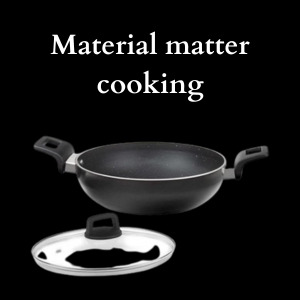
They prioritize using eco-friendly materials and cutting-edge designs to create kitchen tools that enhance cooking experiences while minimizing environmental impact. From non-stick pans to versatile utensils, Material Matter aims to redefine the way we cook and care for our planet.
Stainless Steel: Known for its durability and resistance to staining, stainless steel is versatile and non-reactive. It's ideal for browning, searing, and deglazing. Stainless steel cookware is a popular choice among home chefs and professional cooks alike due to its durability, versatility, and sleek appearance.
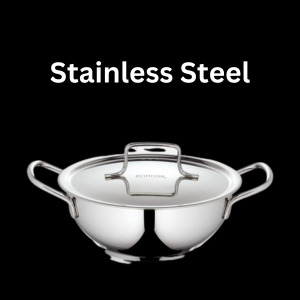
Crafted from an alloy of iron, chromium, and other metals, stainless steel cookware is resistant to rust and staining, making it a long-lasting kitchen staple. Its even heat distribution and non-reactive nature with food make it ideal for a wide range of cooking techniques. In this introduction, we'll explore the benefits and versatility of stainless steel cookware, as well as its maintenance and care to ensure it remains a valuable addition to your kitchen.
Cast Iron: Cast iron cookware retains and distributes heat exceptionally well. It's perfect for slow-cooking, frying, and baking. Seasoning your cast iron adds a natural non-stick surface. Cast iron cookware is a versatile and durable kitchen essential that has been used for centuries. It's made from molten iron that's poured into molds, creating pots, pans, and skillets known for their exceptional heat retention and even heating.
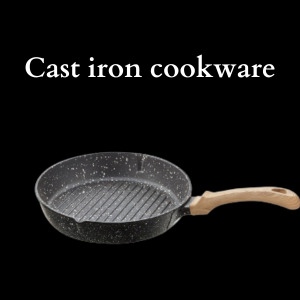
These qualities make cast iron cookware a favorite among professional chefs and home cooks alike. Whether you're searing, frying, baking, or even grilling, cast iron can handle it all. With proper care, it can last a lifetime and develop a natural non-stick surface known as seasoning. Let me know if you'd like to learn more about how to use and maintain cast iron cookware or have specific questions!
Non-Stick: Non-stick cookware has a coating that prevents food from sticking, making it easy to clean. However, it may require gentle care to avoid scratching the surface. Non-stick cookware has revolutionized the way we cook by making food preparation easier and more convenient. These kitchen essentials are typically coated with a non-stick surface, often made from materials like PTFE (Teflon) or ceramic, which prevents food from sticking to the pan.
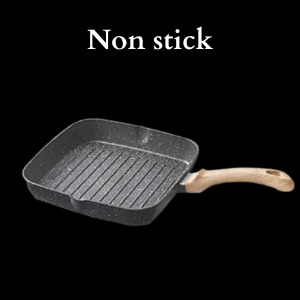
This innovation has reduced the need for excessive oil or butter in cooking, making meals healthier and cleanup a breeze. In this conversation, I can provide you with information, tips, and recommendations related to non-stick cookware
Copper: Copper cookware offers rapid, even heating but often requires a lining of stainless steel or tin to prevent reactivity with certain foods. Copper cookware has a rich culinary history dating back centuries. Renowned for its exceptional heat conductivity, copper cookware offers precise temperature control, making it a favorite among professional chefs and cooking enthusiasts alike. In this guide, we'll explore the benefits, care, and versatility of copper cookware, helping you elevate your culinary skills and create delicious meals.
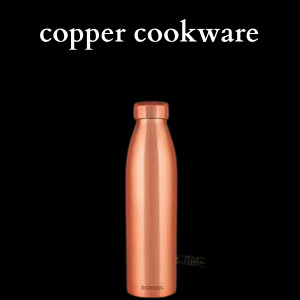
Aluminum: Lightweight and affordable, aluminum cookware heats quickly but may react with acidic foods. Anodized aluminum is a more durable and non-reactive option. Aluminium cookware is a popular choice in kitchens worldwide due to its lightweight, excellent heat conductivity, and affordability. It's commonly used for a wide range of cooking tasks, from sautéing to boiling.
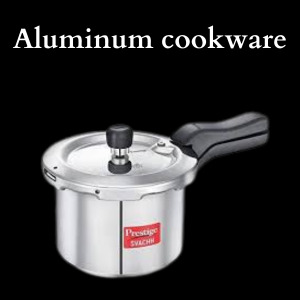
However, it's important to note that uncoated aluminium cookware can react with acidic or alkaline foods, potentially affecting taste and safety. To address this, many aluminium pans have nonstick or anodized coatings. Anodized aluminium is more durable and resistant to corrosion. When choosing aluminium cookware, consider your cooking needs, maintenance preferences, and potential health concerns associated with aluminium exposure.
Choosing the Right Cookware: The cookware you select should align with your cooking style and needs. Here are some considerations. Choosing the right cookware is essential for achieving great results in the kitchen. From pots and pans to utensils and bakeware, selecting the right tools can make cooking more efficient and enjoyable.
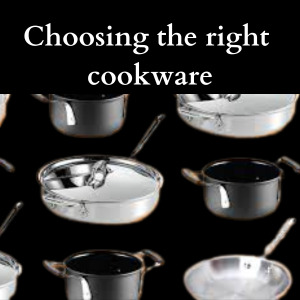
In this guide, we'll explore the key factors to consider when choosing cookware, including material, heat conductivity, durability, and maintenance. Whether you're a seasoned chef or a beginner in the kitchen, making informed choices about your cookware will help you elevate your culinary skills and create delicious meals.
Conclusion :Investing in high-quality cookware is an investment in your culinary journey. By understanding the fundamentals of cookware materials and choosing pieces that align with your cooking style, you'll be well-equipped to create delicious meals for years to come. Remember, the right cookware is not just a tool; it's a partner in your culinary adventures. Happy cooking!
#cookware#kitchen#utensils#home & lifestyle#kitchen appliances#stainless steel#manufacturers#daily update#home cooking#main dishes#alluminum fence#stainless steel kitchen appliances#cooker
2 notes
·
View notes
Text
Price: [price_with_discount] (as of [price_update_date] - Details) [ad_1] From the manufacturer 1400 watts powerful motor comes with 100% copper motor providing strong planetary movement for optimal mixing results 6 speed levels and pulse function supports dough, beating, whisking for making various recipes like bread, roti, cake, cookies, muffin and much more. Use dough hook within speed of 1-3, beater within speed of 2-4, whisker within speed of 5-6. Use PULSE function for quick blending as per need 6 litres stainless steel bowl and 1.5 litres glass blending jar ensures to meet decent cooking volumes for small family, parties or celebrations Metal meat mincer allows you to grind meat with a consistent quality The product comes with splash guard which enables to keep your kitchen clean and non-messy while mixer does its perfect blending, dough or whisking Tilt head is designed for easy to installing and uninstalling bowl and attachment. The Anti-Slip rubber cap are fixed at the bottom for safety and not spilling mixture Accessories: Die-cast Dough Hook, Die-cast Beater , SS Egg Whisk with metal head, Transparent Cover,1.5L glass jar ;metal meat grinder, sausage filler 2 Years warranty [ad_2]
0 notes
Text
Sandwich bottom cookware: Discover its science, benefits, and uses.
Introduction
Sandwich bottom cookware is becoming increasingly popular in modern kitchens due to its superior heat distribution and durability. Whether you are using a sandwich bottom kadai, sandwich bottom frypan, or sandwich bottom wok, this type of cookware is designed to enhance cooking efficiency. The secret lies in its layered construction, which ensures even heating, prevents food from burning, and retains warmth for longer. But what exactly makes sandwich bottom cookware different, and is it worth the investment? Let’s dive into the science behind this innovative cookware and understand its benefits.
Read More: Best Kadai for Deep Frying at Home – Triply Kadai Guide

What is Sandwich Bottom Cookware?
Sandwich bottom cookware is designed with multiple layers of metal, typically stainless steel with an aluminum or copper core. This unique construction allows for even heat distribution, reducing hot spots and ensuring better cooking results. The layers work together to provide durability, prevent food from sticking, and maintain a steady temperature while cooking. Whether you are using a sandwich bottom kadai for deep frying or a sandwich bottom saucepan for making gravies, this technology enhances cooking performance.
Read More: Stainless Steel Cookware Recipes for Delicious Summer Meals
How Does the Sandwich Bottom Design Work?
The key to sandwich bottom cookware lies in its multi-layered design. Here is how it works:
Outer Layer (Stainless Steel): The topmost layer is made of stainless steel, offering durability, rust resistance, and easy maintenance.
Middle Layer (Aluminum or Copper Core): This layer acts as a conductor, distributing heat evenly across the cooking surface.
Inner Layer (Stainless Steel): The inner stainless steel layer ensures food safety, preventing reactions with acidic ingredients.
This construction makes a significant difference when using a sandwich bottom frypan or sandwich bottom wok, as it prevents overheating and provides consistent heat for better cooking.
Read More: Stainless Steel Triply Cookware Set – The Ultimate Guide to Choosing the Best Cookware
Benefits of Using Sandwich Bottom Cookware
1. Even Heat Distribution
One of the biggest advantages of sandwich bottom cookware is its ability to distribute heat evenly. Unlike traditional cookware that may develop hot spots, this design ensures that your food cooks uniformly, preventing burning or undercooking.
2. Faster Cooking and Energy Efficiency
The aluminum or copper core in sandwich bottom cookware allows heat to spread quickly, reducing cooking time. This means less gas or electricity consumption, making it an energy-efficient choice for daily cooking.
3. Enhanced Durability
Cookware like sandwich bottom kadai or sandwich bottom saucepan is built to last. The stainless steel exterior is resistant to corrosion, while the sturdy core maintains its shape and efficiency even after years of use.
4. Versatile Cooking Options
Whether you’re deep-frying in a sandwich bottom wok, sautéing vegetables in a sandwich bottom frypan, or preparing curries in a sandwich bottom saucepan, this cookware adapts to different cooking styles, making it a great addition to any kitchen.
Why Choose Sandwich Bottom Cookware Over Regular Cookware?
Many people wonder if sandwich bottom cookware is truly better than regular stainless steel or non-stick cookware. Here’s a quick comparison:
Read More: 5 Most Common Mistakes People Make with Triply Cookware
Comparison: Sandwich Bottom Cookware vs. Regular Cookware
Feature
Sandwich Bottom Cookware
Regular Cookware
Heat Distribution
Even and consistent
Uneven, may cause burning
Energy Efficiency
Cooks faster, saves fuel
Requires more energy
Durability
Long-lasting, strong build
May warp over time
Maintenance
Easy to clean, does not rust
Some require seasoning or special care
Clearly, sandwich bottom cookware offers more advantages, making it an excellent investment for home cooks and professionals alike.
Read More: Is Triply Cookware Safe? Your Guide to Healthy Cooking with Omichef
How to Care for Your Sandwich Bottom Cookware

To ensure your sandwich bottom kadai, sandwich bottom frypan, or sandwich bottom wok stays in top condition, follow these simple care tips:
Use Mild Detergents: Avoid harsh chemicals that can damage the stainless steel surface.
Avoid High Flames: Excessive heat can discolor the cookware. Use medium to low flame for best results.
Dry Immediately After Washing: This prevents water stains and keeps your cookware looking new.
Use Soft Sponges: To maintain the smooth finish, avoid steel wool or abrasive scrubs.
By following these steps, you can extend the lifespan of your sandwich bottom cookware and keep it performing at its best.
Read More: Biryani Made Easy with the Best Cookware for Biryani
Final Thoughts: Is Sandwich Bottom Cookware Worth It?
If you want cookware that offers even cooking, energy efficiency, and durability, sandwich bottom cookware is a great choice. Whether you opt for a 1ai for deep frying, a sandwich bottom frypan for quick meals, or a sandwich bottom saucepan for rich gravies, this cookware ensures a seamless cooking experience. Its layered construction truly makes a difference, allowing you to cook like a pro every time.
So, is it worth the investment? Absolutely! With its superior performance and long-lasting quality, sandwich bottom cookware is a must-have for every modern kitchen.
The Original Blog Is here : Sandwich bottom cookware: Discover its science, benefits, and uses.
0 notes
Text
Invisacook in Sarasota: Your Top Questions Answered
If you live in Sarasota, you know the kitchen is more than just a place to cook—it’s the heart of the home. With our year-round warm weather, modern design trends, and a focus on seamless indoor-outdoor living, many homeowners are looking for sleek, functional, and clutter-free kitchen solutions. That’s exactly why Invisacook is making waves in Sarasota kitchens!
Let’s answer your top questions about this invisible induction cooktop and why it’s perfect for your Florida home.
Why is Invisacook Perfect for Sarasota Homes?
Q: How does Invisacook maximize counter space?
A: Perfect for open-concept kitchens, Invisacook disappears when not in use, providing extra workspace for entertaining.
Q: Does Invisacook help keep kitchens cool in Sarasota’s warm climate?
A: Yes! Unlike gas stoves, Invisacook heats only the cookware, reducing excess heat in the kitchen.
Q: Will Invisacook match my Sarasota home’s design?
A: Absolutely! Whether you own a Siesta Key beachfront home or a downtown Sarasota condo, Invisacook blends seamlessly into any kitchen style.
Q: Is Invisacook easy to clean and maintain?
A: Yes! With no exposed burners or grates, cleaning is as simple as wiping down your countertop.
How Does Invisacook Work?
Q: What is Invisacook’s technology?
A: It uses hidden induction technology, with the cooktop installed underneath your countertop, making it completely invisible when not in use.
Q: How fast does it cook?
A: Invisacook offers instant heat & precision cooking, heating only the pan for faster and more efficient cooking.
Q: Is it safe?
A: Yes! Smart sensors detect when cookware is in place, and safety features prevent overheating.
How Do You Know Where the Invisacook Burners Are?
Q: If the cooktop is hidden, how do I find the burners?
A: Here’s how:
Beeping System – The unit beeps until a pan is placed on the correct spot.
Custom Markings – You can add subtle etchings or stickers to mark burner zones.
App Connectivity – Control your cooktop directly from your phone.
What Countertops Work Best for Invisacook?
Q: Which countertops are best for Invisacook?
A: Invisacook recommends non-porous, heat-resistant mineral surfaces such as sintered stone, porcelain slabs, and ultracompact surfaces for the best performance and longevity. These materials provide durability and heat resistance, making them the ideal choice for Invisacook installations. Click here to explore recommended mineral surface brands.
⚠️ Important Notice: While some homeowners choose to install Invisacook under natural stone countertops like granite or marble, Invisacook explicitly states that using natural stone is at the homeowner's own risk. The company does not take responsibility for potential damage or performance issues caused by natural stone surfaces.
What Cookware Works with Invisacook?
Q: Do I need special cookware for Invisacook?
A: Yes! Since Invisacook uses induction technology, you’ll need magnetic cookware.
Q: What cookware is recommended for best results?
A: For optimal performance, we recommend:
✔️ Full-Clad Stainless Steel (Tri-Ply or 5-Ply): These pans provide excellent heat distribution and are highly compatible with induction.
✔️ Invisacook Cookware with Risers: Designed specifically for Invisacook, these pans feature built-in risers.
Q: What cookware is not compatible?
A: Avoid these types of cookware:
❌ Aluminum, Copper, and Glass: These materials are not magnetic and will not work with induction unless they have a bonded magnetic base. Even with a magnetic base, they may heat unevenly and pose a risk to your countertop.
⚠️ Cast Iron (for daily use): While cast iron is magnetic, it retains and radiates excessive heat, which can damage your countertop over time. We recommend limiting its use to occasional cooking.
What Are Risers and Why Are They Important?
Q: What are Risers?
A: The risers are raised dots on the bottom of the Invisacook cookware.
Q: Why are they important?
A: These risers optimize contact with the Invisacook surface, ensuring efficient induction heating and even heat distribution. They also help protect both the cookware and the countertop.
Do You Need the Invisamat?
Q: What is the Invisamat, and do I need it?
A: The Invisamat is a protective silicone and fiberglass mat designed specifically for use with Invisacook. While Invisacook cookware with built-in risers eliminates the need for the Invisamat, it's highly recommended for Sarasota homeowners who want to maximize protection and versatility.
Q: When should I use the Invisamat?
A: Use the Invisamat whenever you are cooking with cookware that does not have the built-in risers that are found on Invisacook brand cookware.
Q: What are the benefits of using the Invisamat?
A:
✅ Prevents heat damage – Essential for high-usage kitchens.
✅ Reduces cookware noise – Perfect for quiet, modern spaces.
✅ Dishwasher-safe & easy to clean – Ideal for busy families and rental properties.
What Makes Invisacook So Simple to Clean?
Q: Is Invisacook easy to clean and maintain?
A: Yes! With no exposed burners or grates, cleaning is as simple as wiping down your countertop. And because it is installed with a non porous material, most spills will not stain the countertop.
For expert help choosing the best non-porous material for your Invisacook, contact Lais Luz.
Smart Cooking: Control Invisacook with Your Phone
Q: Can I control Invisacook remotely?
A: Yes! With the Invisacook app, you can:
📲 Turn burners on or off remotely
📲 Adjust temperature settings
📲 Monitor energy use
youtube
Installation: What Sarasota Homeowners Need to Know
Q: Does Invisacook require professional installation?
A: Yes, to ensure proper setup and safety.
Q: What are the electrical requirements?
A:
1-4 burner models: 220V (twist-lock)
1-2 burner models: 110V
5-burner models: Hardwired installation
📍 Need a local installer? Contact Sarasota’s top Invisacook specialists for a quote!
0 notes
Text
The Best Cooking Pots for Every Kitchen
Cooking pots are a must-have in every kitchen, whether you're a beginner or an experienced chef. They come in various shapes, sizes, and materials to suit different cooking needs. With so many options available, it can be tricky to know which ones are the best for your cooking style. If you're looking to upgrade your kitchen, choosing the best cookware UK has to offer could make a big difference in your cooking experience. In this article, we’ll explore different types of cooking pots and help you find the perfect one for your kitchen.
Why Choosing the Right Cooking Pot Matters
The right cooking pot can transform your meals. From simmering soups to boiling pasta or making a delicious stew, having the proper cookware can ensure even heat distribution, reduce cooking time, and make clean-up easier. The best cookware is designed to retain heat and cook food evenly, ensuring that your dishes turn out just right every time. Whether you’re cooking for one or hosting a family dinner, a good cooking pot is an essential tool in the kitchen.
Types of Cooking Pots
When it comes to cooking pots, there are several types to consider. Each one serves a specific purpose, and understanding the difference can help you choose the best one for your needs.
Saucepan
A saucepan is a versatile cooking pot that works well for making sauces, heating liquids, or cooking grains like rice. It’s typically smaller than other pots, making it perfect for cooking smaller portions. Most saucepans come with a lid, which helps retain moisture and speeds up cooking. If you’re looking for the best cookware UK has to offer, consider a saucepan made from high-quality materials like stainless steel for durability and easy cleaning.
Stockpot
If you love making soups, stews, or large batches of pasta, a stockpot is essential. These pots are larger than saucepans, with tall sides that allow for plenty of liquid. A stockpot is perfect for slow cooking, and it can also be used for boiling vegetables or making broths. If you cook large meals often, investing in a good stockpot will save you time and effort in the kitchen.
Dutch Oven
A Dutch oven is a heavy-duty cooking pot, usually made of cast iron, with thick walls and a heavy lid. It’s perfect for slow-cooking dishes like casseroles, roasts, and stews. The cast iron material helps retain heat, making it ideal for dishes that require long cooking times. Many Dutch ovens are enamel-coated, which makes them easy to clean and prevents rust. If you're in the UK, be sure to check out the best cookware available for Dutch ovens for exceptional quality.
Saute Pan
A sauté pan is a shallow cooking pot with a wide flat bottom and slightly higher sides. It's designed for quick cooking methods, like sautéing, frying, and searing. The wide surface area ensures that food can be spread out evenly, allowing it to cook quickly without overcrowding. Whether you’re cooking vegetables or searing meat, a sauté pan can handle it all.
Pressure Cooker
For those who want to save time in the kitchen, a pressure cooker is a game-changer. It cooks food under high pressure, reducing cooking time by up to 70%. Pressure cookers are perfect for making tender meats, soups, and beans quickly. They also preserve more nutrients compared to traditional cooking methods. Many pressure cookers today are electric, which makes them easier to use.
Materials to Look for in Cooking Pots
When choosing cooking pots, the material plays a big role in how your food turns out. Different materials offer various benefits, so it’s essential to pick the one that suits your cooking style.
Stainless Steel
Stainless steel is one of the most popular materials for cookware because it’s durable, easy to clean, and resistant to rust. It also doesn’t react with acidic foods, making it perfect for cooking tomatoes or citrus-based dishes. Many high-quality stainless-steel cooking pots are also made with an aluminum or copper core, which helps distribute heat more evenly. If you're looking for the best cookware UK, stainless steel is always a reliable option.
Cast Iron
Cast iron is another popular choice, especially for pots like Dutch ovens. Cast iron retains heat well, making it ideal for slow cooking and simmering. It also develops a natural non-stick surface over time, which improves with use. If you opt for a cast iron pot, make sure to season it regularly to maintain its non-stick properties and prevent rust.
Non-Stick
Non-stick cooking pots are great for cooking with less oil or fat, which is perfect for healthier meals. They’re easy to clean, as food doesn’t stick to the surface. However, it’s important to be careful when using non-stick cookware, as it can scratch easily. Look for pots that have a high-quality non-stick coating for better durability.
Copper
Copper is an excellent heat conductor, which means that cooking pots made from copper heat up quickly and provide even heat distribution. However, copper can be reactive with certain foods, so it’s often lined with stainless steel. Copper cooking pots are generally more expensive, but they offer excellent cooking performance.
How to Care for Your Cooking Pots
Taking care of your cooking pots will help them last longer and perform better. Here are a few tips to ensure that your pots stay in great condition:
Clean After Each Use: Always clean your pots after each use to prevent food residue from building up.
Avoid Abrasive Scrubbers: When cleaning, use a soft sponge or cloth to avoid damaging the surface, especially for non-stick and enamel-coated pots.
Season Cast Iron: If you have cast iron pots, remember to season them regularly to maintain their non-stick surface and prevent rust.
Store Properly: Make sure to store your pots in a dry place, and use pot protectors if necessary to prevent scratches.
Conclusion
Cooking pots are essential for every kitchen, and choosing the right one can make a significant difference in how your meals turn out. Whether you're cooking a quick meal or preparing a slow-cooked stew, the right pot will ensure that your food cooks evenly and tastes great. Consider your cooking needs, the material that best suits your style, and the size of the pot before making your purchase. If you're in the UK, you’ll have access to some of the best cookware available, ensuring that you have the tools you need to make delicious meals for years to come.
0 notes
Text
10 Sandwich Bottom Cookware Myths Debunked (With Proof)

Introduction
When it comes to choosing the right cookware, one term that often pops up is “sandwich bottom cookware.” Many home cooks and professional chefs alike swear by its durability and heat distribution, while others remain skeptical due to the myths surrounding it. So, what exactly is sandwich bottom cookware, and why do these myths persist? In this blog, we will explore the most common misconceptions and debunk them with facts. If you have ever wondered whether sandwich bottom cookware is worth the investment, this article will provide clarity and help you make an informed decision.
Read me : Sandwich Bottom Cookware: The Perfect Blend of Durability and Efficiency.
What is Sandwich Bottom Cookware?
Sandwich bottom cookware refers to pots and pans that have a multi-layered base, usually consisting of an aluminum or copper core sandwiched between two layers of stainless steel. This construction enhances heat conductivity, ensuring even cooking and eliminating hotspots. The outer stainless steel layers provide durability and resistance to corrosion, while the aluminum or copper core facilitates rapid and even heat distribution.
Many people confuse sandwich bottom cookware with tri-ply cookware, which has layers throughout the entire body, not just the base. However, both types are designed to offer better cooking performance than standard stainless steel or aluminum cookware.
Now, let’s debunk the top 10 myths surrounding sandwich bottom cookware with proof, addressing real consumer and user questions.

10 Sandwich Bottom Cookware Myths Debunked (With Proof)
Myth 1: Will sandwich bottom cookware warp easily?
Reality: The multi-layered construction of sandwich bottom cookware makes it highly resistant to warping. High-quality sandwich bottom cookware is designed to withstand temperature variations without deforming.
Myth 2: Does sandwich bottom cookware heat unevenly?
Reality: The aluminum or copper core in the base ensures even heat distribution, preventing hotspots and allowing food to cook uniformly. Proper usage, such as preheating on low heat, further enhances its efficiency.
Myth 3: Is stainless steel sandwich bottom cookware unsafe for cooking?
Reality: High-quality sandwich bottom cookware is made from food-grade stainless steel and aluminum, which are non-toxic and safe for cooking. They do not react with acidic foods, ensuring food safety.
Myth 4: Does food stick to sandwich bottom cookware?
Reality: Stainless steel cookware, including sandwich bottom variants, requires proper preheating and oiling to create a non-stick effect. When used correctly, food will not stick.
Myth 5: Is sandwich bottom cookware too expensive?
Reality: While sandwich bottom cookware might cost more than standard stainless steel or aluminum cookware, it is a long-term investment. Its durability and superior performance justify the price.
Myth 6: Is sandwich bottom cookware difficult to clean?
Reality: Sandwich bottom cookware is relatively easy to clean, especially when maintained properly. Stubborn stains can be removed using baking soda, vinegar, or a mild stainless steel cleaner.
Myth 7: Can sandwich bottom cookware be used on induction cooktops?
Reality: Most sandwich bottom cookware is induction-compatible, thanks to its stainless steel outer layer. Always check the manufacturer’s specifications before purchasing.
Myth 8: Does sandwich bottom cookware take too long to heat up?
Reality: While stainless steel alone has lower thermal conductivity, the aluminum or copper core in sandwich bottom cookware ensures rapid heating, reducing cooking time significantly.
Myth 9: Will sandwich bottom cookware affect the taste of food?
Reality: Unlike reactive cookware like copper or cast iron, stainless steel does not affect the taste of food. It preserves the natural flavors of ingredients.
Myth 10: Does sandwich bottom cookware have a short lifespan?
Reality: With proper care, sandwich bottom cookware can last for decades. It is highly resistant to rust, corrosion, and scratches, making it a durable choice for any kitchen.

Omichef — India’s №1 Sandwich Bottom & Tri-Ply Cookware Provider
If you are looking for premium-quality cookware, look no further than Omichef. As India’s №1 cookware provider, Omichef offers a range of sandwich bottom cookware designed for durability, superior heat distribution, and convenience. Our products include stainless steel sandwich bottom cookware, Tri-ply cookware, and other high-performance kitchen essentials.
Omichef’s sandwich bottom cookware is perfect for both home cooks and professionals who want efficiency and reliability in their kitchen. Whether you need a sturdy frying pan, a versatile saucepan, or a durable pressure cooker, Omichef has you covered.
Read me : Omichef Triply Casserole — Premium Cookware for Every Kitchen in 2025.
Conclusion
There are many misconceptions about sandwich bottom cookware, but as we have seen, they are mostly myths. With excellent heat distribution, safety, durability, and affordability, sandwich bottom cookware is a valuable addition to any kitchen.
Ready to upgrade your kitchen? Explore Omichef’s Premium Stainless Steel Cookware Collection today and experience the difference! Visit our Omichef cookware website now to browse our range of high-quality cookware. Plus, we are available on Flipkart, so you can shop conveniently from the comfort of your home. Don’t wait — enhance your cooking experience with Omichef today!
The Original Blog Is Here : 10 Sandwich Bottom Cookware Myths Debunked (With Proof)
#omichef#india 2025#triply cookware#healthy eating#omichef cookware#stainless steel cookware#indian food#healthy cooking#healthy cookware#Sandwich Bottom Myths 2025#Sandwich bottom cookware
0 notes
Text
How to Use a Radiator Neck for Maximum Efficiency

The radiator is a soft part and must be handled with extreme caution and in a way that does not damage the product. Under no circumstances should the radiator be carried or lifted by the filler neck. The center of the filler neck or caps should be visually and carefully inspected for contaminants or dust particles that may physically affect the activity of the filler neck or caps. In some cases, the center point can be cleaned by blowing compressed air.
The entire process of cleaning the filler neck involves a garden hose with a high-quality jet at the end and inside the radiator hose in the center to clean insects from the front of the radiator. WARNING: Direct water pressure should not be used at an angle and avoid using a pressure washer as both will easily bend the fins. The radiator can then be washed with clean water, inside and out. The compressed coolant can then be dried and air used to remove any remaining deposits.
Ideally, radiator filler necks are the front end of the vehicle's fuel inlet. They help allow fuel to reach the bottom of the pump nozzle and enter the fuel tank. Some features of the radiator filler neck are:
Its double coating provides strong protection against corrosion.
It uses a specific conductive coating that eliminates static charge
It contains a ground wire for added precaution.
Some improved design models are also available without a sleeve
Specifically designed to meet the manufacturer's needs.
Life cycle, fuel absorption and temperature are thoroughly tested to ensure good performance.
Caps Necks offers radiator filler necks in different models, specifications and features. For a long time it was the leading supplier in the United States. The company has a variety of radiator filler necks made of aluminum, stainless steel and copper. The filler caps they offer fit a variety of necks. You can also purchase hydraulic filler tapes, tank seals and utility tanks.
Contact: Caps and Necks
6135 Harrison Drive, Unit 6,
Las Vegas, NV 89120
Telephone: 702–641–3500
Email: [email protected]
Website: https://www.capsnecks.com
0 notes
Text

Leading Centrifugal Screen Manufacturer – Fine Perforators Delivering Precision Solutions
Fine Perforators has established itself as a leading centrifugal screen manufacturer in India, delivering innovative and precision-engineered screening solutions since 1969. Our range of centrifugal screens, crafted from high-quality brass, copper, and stainless steel, is designed for both flat bottom and semi-automatic centrifugal machines. We pride ourselves on producing durable, efficient, and reliable screens that meet the rigorous demands of industries such as sugar processing, filtration, and general industrial applications. With advanced manufacturing technology and decades of expertise, Fine Perforators offers customized products tailored to your unique requirements.
0 notes
Text
A hot water cylinder, also sometimes called a boiler, calorifier tank, or geyser, is a tall, cylindrical tank usually made of copper, stainless steel, or enamel-lined steel. It has an insulated exterior to minimise heat loss and one or two inlets near the bottom to allow cold water to flow in as hot water is drawn out for use in the home.
0 notes
Text
A hot water cylinder, also sometimes called a boiler, calorifier tank, or geyser, is a tall, cylindrical tank usually made of copper, stainless steel, or enamel-lined steel. It has an insulated exterior to minimise heat loss and one or two inlets near the bottom to allow cold water to flow in as hot water is drawn out for use in the home.
0 notes